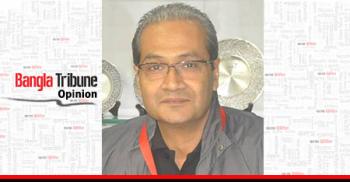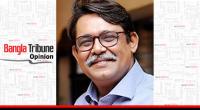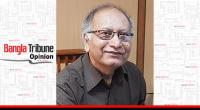 Bangabandhu-1 satellite, to my mind, has now become a symbol for Bangladesh’s willingness to advance, to show our entire population that have science in our mind in order to progress. The satellite launch has been one of the best known milestones in the history of Bangladesh. Everybody felt elated to have found a space in outer space. It has also reflected our commitment to digitalize our lifestyle, our commitment to utilize science in our livelihood.
Bangabandhu-1 satellite, to my mind, has now become a symbol for Bangladesh’s willingness to advance, to show our entire population that have science in our mind in order to progress. The satellite launch has been one of the best known milestones in the history of Bangladesh. Everybody felt elated to have found a space in outer space. It has also reflected our commitment to digitalize our lifestyle, our commitment to utilize science in our livelihood.
Having said that, we must also say that our aspiration for utilizing science and driving our lives with the help of science has been sky high. We have had many successes in the scientific front. We have successfully decoded the jute plant genome and opened up a new vista in the development of variety of the world's most adorned biodegradable natural fibre.We have increased our agricultural produce through various scientific researches and have been successfully feeding everybody in the country.
In the recent times, our young scholars have also brought accolades for us. Let me provide a few examples. A Bangladeshi scientist, Rubab Khan, and his team has discovered five supersize stars "Eta twins" in other galaxies on par with a monstrous stellar system in our own Milky Way.US-based Bangladeshi Professor Selim Shariar discovered gravitational waves – which now confirm Albert Einstein's famous theory of relativity.
Dipanker Talukdar brought fame to Bangladesh by detecting gravitational waves and ripples in the space. Sayeef Salahuddin developed nanoscale electronic and spintronic devices for low power logic and memory applications.Tamjidul Hoque, assistant professor of computer science, was awarded by the Louisiana Board of Regents Industrial Ties Research Subprogram for developing the software tools and theoretical underpinning needed to help convert algae into biofuel.
Dr Miratul Mohamid Khan Muqithas been named as one of awardees of the prestigious European Molecular Biology Organisation Young Investigator Programme in 2016.There are more; thousands of highly skilled Bangladeshi scholars are now engaged in teaching profession across the educational institutions of the world.
However, the discoveries, inventions and knowledge of these people have brought little comfort in the lives of those who still live here. The achievements of these pathfinders haven’t inspired us to lead a life based on science. We failed to involve science in our daily life; we failed to imbue science in the psyche of the common people.
Yes, we love technology a lot; we would do anything to buy the latest gadget that we can find in the market. But leading our lives in a scientific way is perhaps the last thing in our mind.
Takes the road accidents, for example. About 15,000 people die across the country due to these accidents. These deaths are one of proofs that we’re not leading our lives based on science. Movements of people as well as vehicles have a geometry or for that matter a science and we haven’t been following what science says. If we look at our roads, we see there’s absolutely no geometry in our movements. Moreover, we think we have come a long way as far as science is concerned, but we’re yet to discover a simple brake for the pushcarts that carry our goods in the cities.
What do you think of the horrendous traffic that we ourselves have created? Does it reflect that we’re a science-focused lot? Absolutely not. We forget that behaviour is also a science. If we consider ourselves as humans, the best creation among the species, we must act like the best.
Let’s have a look at our mindboggling urbanization, the real estate sector to be specific. I heard there are several master plans for Dhaka city. The real estate hawkers are leaving no place unturned to erect buildings across our cities, towns and villages.
If you consider our sewage system, you’d find a dilapidated condition. A half-an-hour shower would submerge our roads with waist-deep water! So, what have we been planning! And how? We’ve been developing our cities without thinking about simple science that our high-rises won’t sustain if we’re not true to the theories of science!
The way we have destroyed our natural age-old water bodies and rivers doesn’t at all tell a story of our scientific minds. How could we be so stupid that we had to destroy the lifeline!
When I go back to my school days, I remember most of us in our class were gung-ho about studying the science discipline. And we did; more than 90 per cent of had studied science. What happened after that? In real life? How many doctors, engineers and applied physicists have we created in the last 47 years? Many; enough to turn this nation into a science-minded one. However, that didn’t happen; we haven’t become a lot that cares for science.
Now that we embarked on embedding digital technologies in our lifestyle, we must, first, assess how successful we were in our analogue way of life. Were we smart in the analogue era? If we weren’t, what would happen if we add high-tech to our unsmart – devoid of science - way of living?
I’d urge our leaders in charge to strategize a vision that would aim to imbue a mindset of science in all of us. We haven’t conceived the essence of science all these years and that’s why we’ve been driving ourselves quite erratically. Let’s, first, conceive science and then, apply it.
Ekram Kabir is a story-teller and a columnist.


